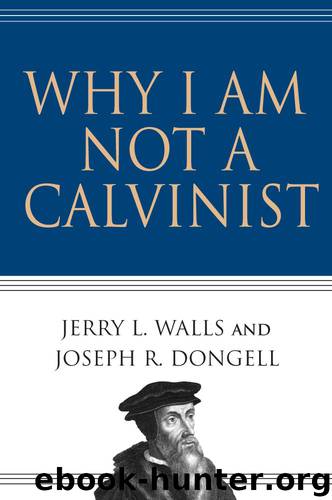Why I Am Not a Calvinist by Jerry L. Walls & Joseph Dongell

Author:Jerry L. Walls & Joseph Dongell [Walls, Jerry L. & Dongell, Joseph]
Language: eng
Format: epub
Tags: Calvinist, Christianity, Religion, Systematic, Biblical Studies, Christian Theology, History
ISBN: 9780830832491
Google: HpkRhNzrjcgC
Amazon: 0830832491
Barnesnoble: 0830832491
Publisher: IVP Books
Published: 2004-03-26T00:00:00+00:00
6 While the Westminster Confession can be read in a way that is broadly coherent, we believe it is still inconsistent at a deeper lever because it also has strands of libertarian freedom running through it. For argument, see Jerry L. Walls, Hell: The Logic of Damnation (Notre Dame: University of Notre Dame Press, 1992), pp. 57-70. We will take this issue up in chapter five.
Consequently, he points out, “Calvinists as determinists must either reject freedom altogether or accept compatibilism.”7 Since he believes Scripture clearly teaches that human beings are free and responsible for their actions, he believes that Calvinists must opt for compatibilism.
We appreciate Feinberg’s fairness in acknowledging that both views of freedom are at least possible. Some writers on both sides of this dispute try to avoid the debate by simply claiming that the view of freedom they reject is incoherent. We agree with Feinberg that this strategy does not further the discussion or resolve anything. While we reject compatibilism for what we believe are good biblical, theological and moral reasons, we don’t want to claim that it is a view of freedom that is not even possibly true.
Although compatibilism is a popular position among Calvinists, particularly among the philosophically informed, we want to stress that not all Calvinists embrace it. Some Reformed theologians have argued for another option. These writers do not agree with Feinberg that a Calvinist must either give up freedom altogether or accept compatibilism. To the contrary, they hold that we are required by Scripture to accept both God’s control of all things and human freedom, but they insist that it is not up to us to find a way to reconcile these truths. Popular evangelical author J. I. Packer is a proponent of this view. He endorses this position in his widely read book Evangelism and the Sovereignty of God.
As he notes, divine sovereignty and human responsibility are both clearly taught in Scripture. And he understands sovereignty in the Calvinistic sense that God unconditionally determines everything that happens. “Man is a responsible moral agent, though he is also divinely controlled; man is divinely controlled, though he is also a responsible moral agent.”8 Packer identifies this pair of claims as an “antinomy” because he believes we cannot dispense with either one of them, nor can we understand how they are compatible. From the standpoint of finite human reason, it may seem contradictory to affirm both of these claims and therefore impossible to do so. Here is Packer’s advice for dealing with such antinomies.
Download
This site does not store any files on its server. We only index and link to content provided by other sites. Please contact the content providers to delete copyright contents if any and email us, we'll remove relevant links or contents immediately.
| Buddhism | Christianity |
| Ethnic & Tribal | General |
| Hinduism | Islam |
| Judaism | New Age, Mythology & Occult |
| Religion, Politics & State |
Cecilia; Or, Memoirs of an Heiress — Volume 1 by Fanny Burney(31348)
Cecilia; Or, Memoirs of an Heiress — Volume 3 by Fanny Burney(30947)
Cecilia; Or, Memoirs of an Heiress — Volume 2 by Fanny Burney(30907)
The Secret History by Donna Tartt(16656)
Sapiens: A Brief History of Humankind by Yuval Noah Harari(13072)
Leonardo da Vinci by Walter Isaacson(11915)
The Radium Girls by Kate Moore(10915)
Sapiens by Yuval Noah Harari(4551)
The Wind in My Hair by Masih Alinejad(4427)
How Democracies Die by Steven Levitsky & Daniel Ziblatt(4411)
Homo Deus: A Brief History of Tomorrow by Yuval Noah Harari(4289)
Endurance: Shackleton's Incredible Voyage by Alfred Lansing(3854)
The Silk Roads by Peter Frankopan(3777)
Man's Search for Meaning by Viktor Frankl(3647)
Millionaire: The Philanderer, Gambler, and Duelist Who Invented Modern Finance by Janet Gleeson(3575)
The Rape of Nanking by Iris Chang(3526)
Hitler in Los Angeles by Steven J. Ross(3446)
The Motorcycle Diaries by Ernesto Che Guevara(3344)
Joan of Arc by Mary Gordon(3269)
